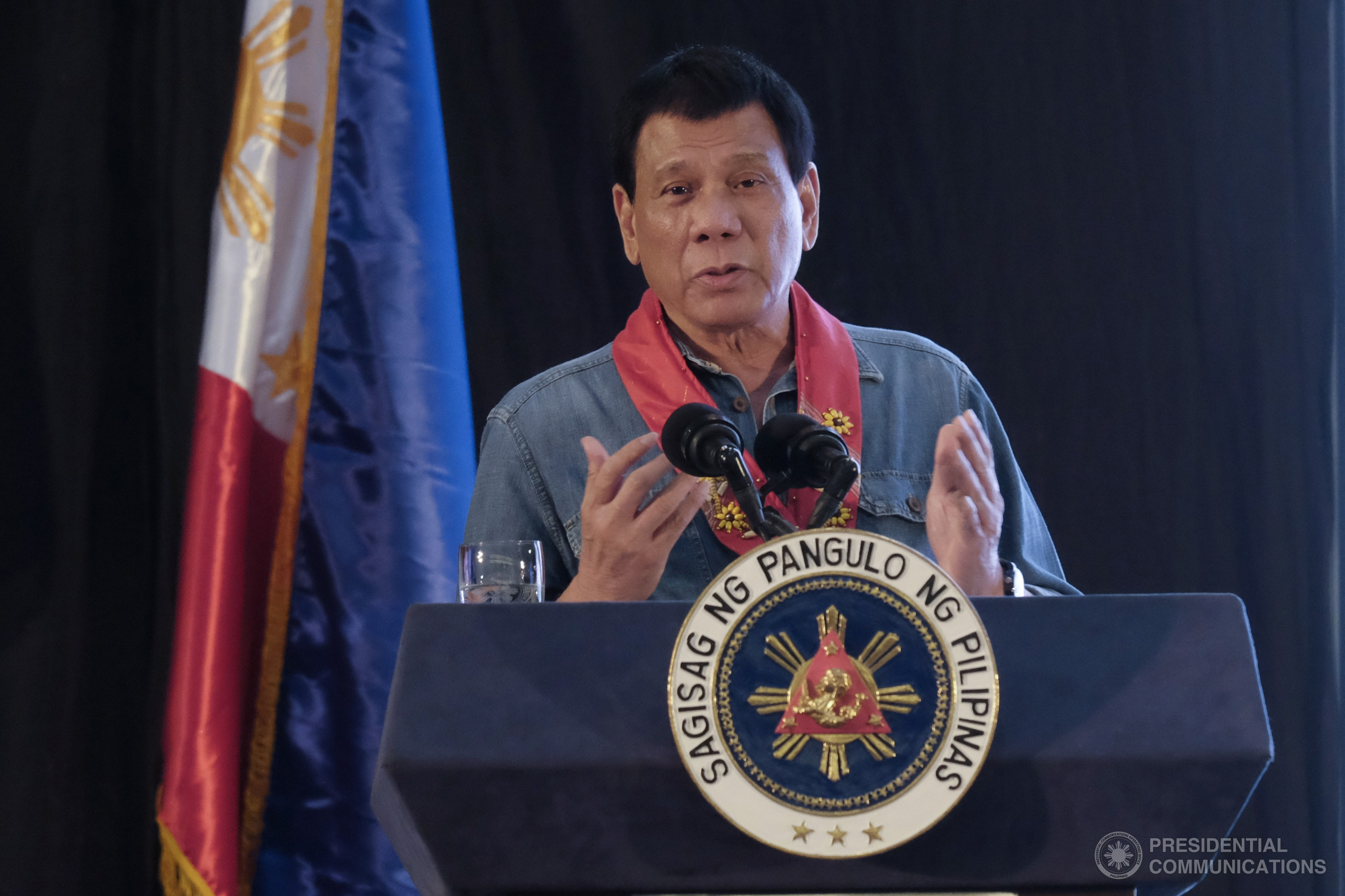Breaking
President Duterte scraps peace talks with NDFP; asks all NDFP delegation to return home

President Rodrigo Duterte is asking all the Philippine delegation to the peace negotiations to “fold up the tents and come home” as he is pulling out government from the talks with the National Democratic Front of the Philippines (NDFP).(Photo: RENE LUMAWAG/Presidential Photo)
DAVAO CITY –President Rodrigo Duterte is asking all the Philippine delegation to the peace negotiations to “fold up the tents and come home” as he is pulling out government from the talks with the National Democratic Front of the Philippines (NDFP).
This came after the President lifted the government’s unilateral ceasefire with the communist revolutionaries in response to the New People’s Army’s (NPA) decision to terminate talks effective Feb. 10.
In an interview during his visit to the tomb of his mother on Saturday night, Duterte said, “I am not ready to resume peace talks. As I have said…I’d like to tell the Filipino people peace with communists might not come in this generation.”
The next peace talks Duterte said could come after his term “if there is one”. “Peace talks will remain cancelled unless there is a compelling reason that will benefit the interest of the nation,” he said.
When asked what will happen to his campaign promise, Duterte said he has tried everything and even walked the extra mile by releasing their leaders to pave the way for the resumption of the peace talks in Oslo, Norway.
But the President noted he was being pressed to release all 400 political prisoners. “I have tried everything…I walk the extra mile…release prisoners…release the leaders so they can go to Oslo to talk…now they want 400+ prisoners who fought the government under a rebellion kind.”
The President reiterated that releasing all political prisoners can be done only after a successful talk.
“Di ka mag release sa prisohan (You can’t release from the prison) at the beginning. So what’s there to talk about? Kung i-release ko lahat sila (If I will release them all) why bother to talk. I told soldiers to go home to your camps, clean your guns and prepare for long struggle.”
It may be recalled that the Duterte administration released 21 political prisoners, who are members and consultants of the NDFP, before the start of the peace talks in Oslo in August. This is the most number ever released in the history of the peace process.
The President’s order to pull out from the talks is the 16th disruption so far recorded in the history of the peace negotiations between the GRP and the NDFP.
Throwback
Since 2001, the formal peace negotiations was stalled after the NDFP withdrew from the negotiating table on account of the renewed inclusion of the Communist Party of the Philippines founding chair Jose Maria Sison and the CPP-NPA in the US terrorist list. During the Rome talks last month, both sides agreed for the GRP peace panel to recommend to the President to request the US government to de-list Sison from the list.
Talks resumed in 2004 but broke down again in 2005 when NDFP called for the ouster of then President Gloria Macapagal-Arroyo.
In February 2011, both parties agreed to complete the talks but the NDFP suspended talks in June of the same year on the issue of prisoner release. There was also the failure on the Joint Agreement on Safety and Immunity Guarantees (JASIG) verification.
Another disruption was when the NDFP reportedly backtracked from their commitments and insisted on their demand that the government release their 14 priority consultants, who are all facing criminal charges in various courts, before formal peace negotiations are resumed.
Although there had been informal talks through the facilitation of the Royal Norwegian Government (RNG) as third party facilitator, these were stymied by prejudicial questions, impediments and preconditions raised at the negotiating table.
Following his election in May, Duterte promised to release all their leaders to open the talks again with the reds.
True to his promise, in June before his inauguration, Duterte sent a government team composed of Jesus Dureza and Silvestre Bello III, both were later appointed as Presidential Peace Adviser and Labor Secretary and GRP panel chair, to Oslo to initially discuss with NDFP Chief Consultant Jose Maria Sison and NDFP chair Luis Jalandoni.
In that talk, both sides agreed to resume the talks, accelerate the process for negotiations and reconstitution of the JASIG, among others.
During his inauguration in July, Duterte declared a unilateral ceasefire before the formal peace talks started in August although this was lifted shortly after an attack of government forces in Compostela Valley. The President restored the unilateral ceasefire before the start of the formal talks in August, last year.
On Aug. 22, the first round of formal peace talks resumed in Oslo. It was also in the first round that the NDFP declared on Aug. 26 its own unilateral ceasefire that the NPA is terminating effective Feb. 10.
At the third round on Jan. 19 – 26 in Rome, significant milestones were sealed by the both sides: the signing of the supplemental guidelines for the Joint Monitoring Committee on the Comprehensive Agreement on Respect for Human Rights and International Humanitarian Law (CARHRIHL) that will govern the process of filing complaints for human rights violation of both sides; the signing of the ground rules for GRP and NDFP committee work on the socio-economic reforms; signing of completed drafts on Political and Constitutional Reforms; and their commitment to move the talks forward despite some setbacks.
Forward
The GRP and NDFP ceasefire committees are supposed to meet on February 22 in Utrecht, Netherlands to discuss the GRP draft proposal for a bilateral ceasefire and the depositing of the list of names of NDFP consultants using aliases.
The fourth round of talks is supposed to take place April back in Oslo.
During the Saturday night interview, Duterte said he is no longer interested. He added, “I am not interested arguing with them.





















